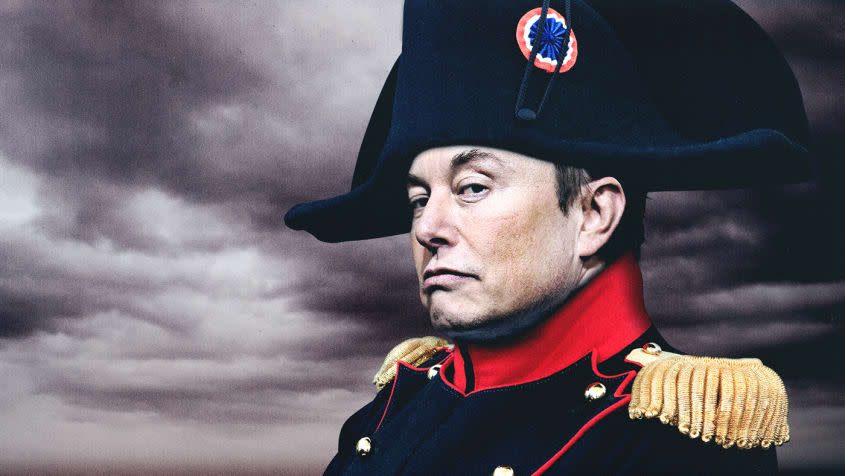Is Elon Musk too powerful?

- Oops!Something went wrong.Please try again later.
Elon Musk has made little secret of his personal interest and engagement in Russia's year-and-a-half-long invasion effort against Ukraine, and that country's ongoing counteroffensive against their would-be occupiers. He has publicly admitted to "trying my hardest to de-escalate this situation and obviously failing," and mused to his more than 100 million followers on X, formerly Twitter, about which parts of Ukraine should be formally annexed into Russia, even while supplying thousands of his proprietary "Starlink" communications terminals to the region at the behest Ukrainian officials desperate for internet access to coordinate their military maneuvers. "Starlink is indeed the blood of our entire communication infrastructure now," Ukraine's digital minister told The New York Times this summer, highlighting the degree to which that country is technologically dependent on Musk's products — and by extension, Musk himself.
That dependency took on a particularly urgent note this week, with a revelation from Musk biographer Walter Isaacson that the billionaire had personally intervened to withhold Starlink services from a planned Ukrainian offensive against Russia's Black Sea fleet in occupied Crimea. Musk himself later confirmed the report — excerpted from Isaacson's upcoming biography, and first published in The Washington Post — by claiming on X that "SpaceX would be explicitly complicit in a major act of war and conflict escalation" had he complied with Ukraine's request for satellite connectivity in the region. However, by acknowledging that he himself had thwarted a sovereign country's military in what has essentially become a war of existential survival, Musk has inadvertently re-energized a long-simmering criticism that he has personally amassed too much power for a single, largely unaccountable, individual.
What the commentators said
Musk's decision allowed Russia to continue its naval bombardment of Ukrainian cities, Ukrainian official Mykhailo Podolyak said on X, calling it "the price of a cocktail of ignorance and big ego." Podolyak's criticism is an exception though, as "few nations will speak publicly about their concerns, for fear of alienating Mr. Musk" according to various intelligence and cybersecurity officials who spoke with The New York Times. Despite Musk being neither "a diplomat or statesman," one Pentagon official who spoke with The New Yorker's Ronan Farrow said he felt compelled "to treat him as such, given the influence he had" in the ongoing Ukrainian-Russian conflict. But rather than condemn Musk to outright villainy, Farrow placed the ultimate blame on "the systems around him."
It is "vast economic systems and political trend lines" that have created the opportunity for "a single mega-billionaire of this type" to be able to "fill the spaces that are going fallow at the hands of the state," Farrow explained on The New Yorker's The Political Scene podcast, citing Musk's dominance of both the private space travel and communications industries. "This is insane that we've let it get to this," agreed The Daily Beast's Andy Levy, placing similar blame on the vacuum ceded by the government in certain industries that allowed Musk to concentrate such acute power in himself — even to the detriment of his own companies. After intense negotiations to charge the Pentagon to keep Starlink services available to the Ukrainian military in 2022, Musk backtracked, having "succumbed to the bullshit on Twitter and to the haters at the Pentagon who leaked the story," SpaceX President Gwynne Shotwell told Isaacson. "The Pentagon had a $145 million check ready to hand to me, literally."
What next?
Think of Musk as "a conglomerate," CNN's Seth Fiegerman urged at the onset of the billionaire's Twitter takeover. By controlling so many interconnected industries, "each arm of his empire potentially gives him more leverage, real or imagined, in advocating for the others." Operating against a "backdrop of crumbling infrastructure and declining trust in institutions," Musk excels at identifying "crucial areas where, after decades of privatization, the state has receded" and filling those voids with his own products," Farrow said. Moreover, "efforts to rein him in have had limited success," he explained to The Political Scene. Quoting an FAA official who declined to punish Musk for an unauthorized rocket launch, Farrow explained, "look, the guy is just so rich a fine doesn't hurt a company that he's running."
